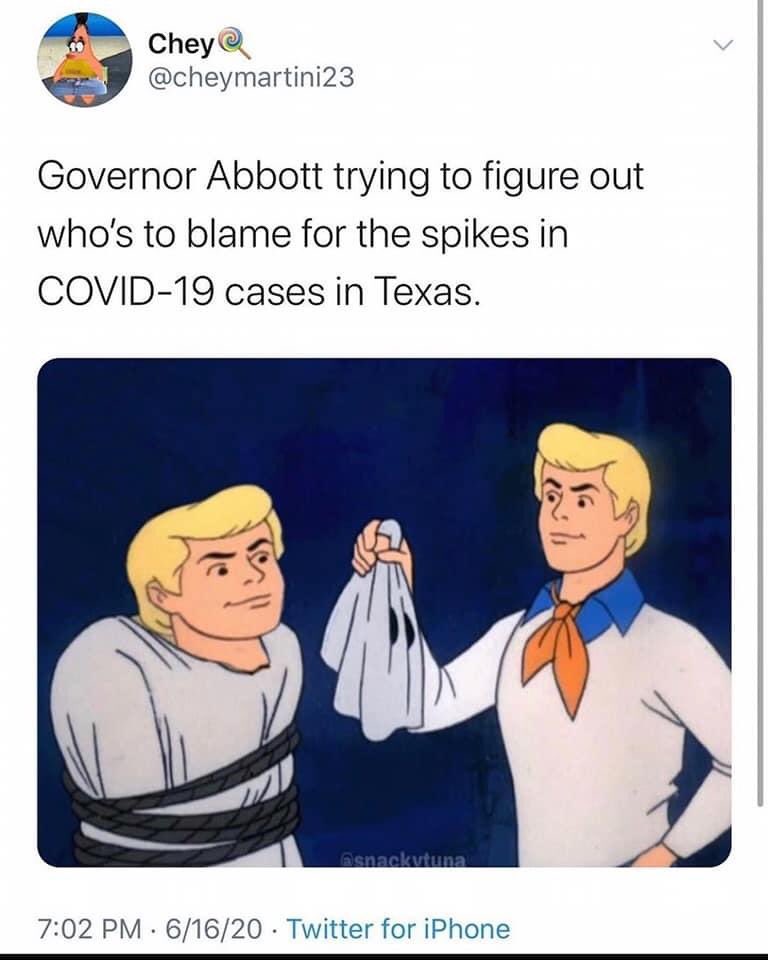Who knows? We’ll see if he actually does it.
Fresh off the defeat of two of his legislative priorities Sunday night when Democrats abandoned the Texas House to block a sweeping elections bill, Gov. Greg Abbott flexed his executive muscle Monday — vowing to defund a co-equal branch of government while raising questions about the separation of powers in Texas.
“I will veto Article 10 of the budget passed by the legislature,” he wrote on Twitter. “Article 10 funds the legislative branch. No pay for those who abandon their responsibilities.”
Abbott did not give additional details about how the veto would work, telling his nearly 600,000 Twitter followers only to “stay tuned.” He’s also said that lawmakers will be brought back for a special legislative session this year to pass the failed priority bills. But the veto announcement on social media sparked concerns about the increasing encroachment by the state’s executive branch into the legislative branch’s purview.
“We have not seen a governor in modern times who has taken such a step to minimize the legislative branch of government,” said Brandon Rottinghaus, a political scientist at the University of Houston. “The Texas Constitution sets out a balance of power, and it has stuck to that since the inception of the Texas government. To change that by altering which branch was able to be politically and financially stronger is clearly antithetical to the Constitution.”
[…]
On top of funding the two chambers of the Legislature, Article X of the state budget also funds nonpartisan agencies that are crucial for policymaking, including the Legislative Reference Library, which conducts research for the Legislature; the Legislative Budget Board, which develops policy and budget recommendations and provides fiscal analyses for legislation; the Legislative Council, which helps draft and analyze potential legislation; the State Auditor’s Office, which reviews the state’s finances; and the Sunset Advisory Commission, which reviews the efficiency of state agencies.
Several of these agencies would be crucial for the all-important redrawing of political maps that lawmakers are expected to take up in an already planned special session in the fall.
[…]
Rottinghaus, who is working on a book about former Gov. Rick Perry, said the growth of the executive branch’s power is one of the themes of the book, but “Abbott has taken it to the next level.”
“Perry made the tune popular, but Abbott took it to No. 1 with a new band,” he said.
Perry could serve in some ways as a cautionary tale for Abbott. In 2007, Perry signed an executive order mandating that all sixth grade girls get vaccinated for the human papillomavirus, which can cause cervical cancer. But lawmakers came back during that legislative session and blocked his executive order, saying Perry had overstepped his authority.
“He backed off immediately. He saw he’d gone too far,” Rottinghaus said. “That’s a battle that the governor doesn’t want to pick because the courts could say he’s wrong, the Legislature could defund the executive branch in the same way — there’s all kinds of options that the Legislature can use. … That’s what Perry found. If you cross the Legislature, you’re risking a revolt you can’t contain.”
Not everyone believes the governor will follow through, however.
Abbott has until June 20 to announce his vetoes. The current biennial budget ends Aug. 31. If Abbott called back lawmakers before the end of August and got his priority bills passed, he could then let lawmakers restore the funding for the new budget starting in September without any impact to people employed by the legislative branch.
“Abbott likes to puff up and then deflates very quickly,” said Matt Angle, a Democratic political operative who runs the Lone Star Project. “He doesn’t have the guts to send termination notices to public servants who are just doing their jobs.”
On Thursday, Abbott told Lubbock radio host Chad Hasty he would call lawmakers back for two special sessions. The previously planned fall special session would be in September or October and deal with redistricting and the allocation of $16 billion in federal COVID-19 funds. But before that, Abbott said, he’d call legislators back to work on the defeated elections and bail bills.
Rep. Lyle Larson, R-San Antonio, said he was doubtful the veto would come to pass and said it would reflect poorly on Abbott if it did. Staffers for Republican lawmakers who played no role in the Democratic walkout would also be harmed.
“If it’s a political statement that he’s making, that’s one thing,” Larson said. “But if he follows through with it, I think a lot of people will lose confidence in his ability to govern. I know independent voters, Democratic voters and a lot of Republican voters will lose confidence in his ability to govern if he starts retaliating toward the majority party that did not walk out of the Legislature. It makes no sense.”
See here for some background. Not making sense is not a bar to Abbott. I still think he’s more likely to back down at the end than not, but if I’m wrong about that I hope someone files a lawsuit and forces the courts to sort it out. I mean, if Abbott can zero out the legislative budget, he can do the same for the courts, and I have to think they would not like that. There’s only one way to find out, if it comes to that.

